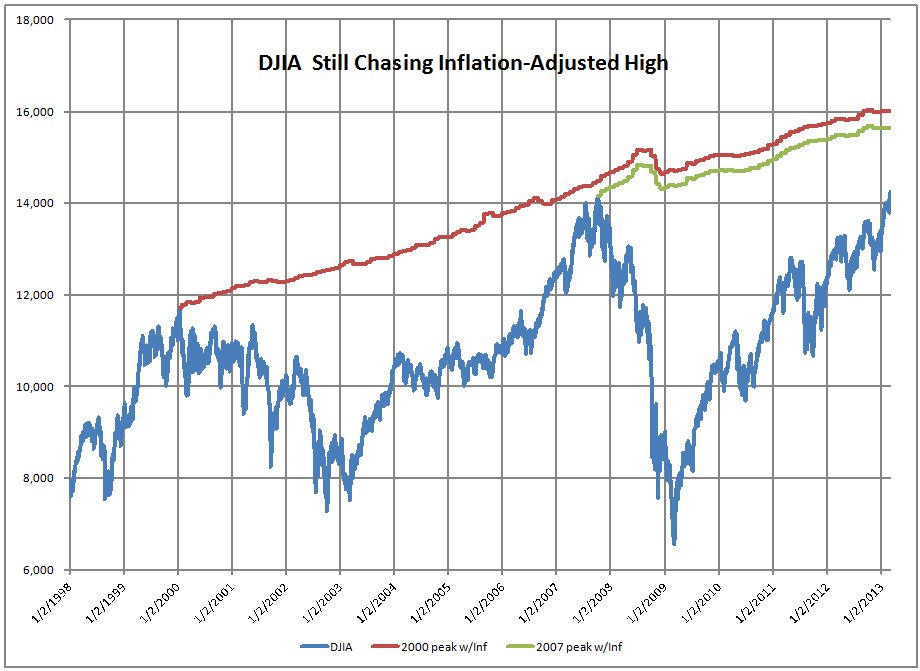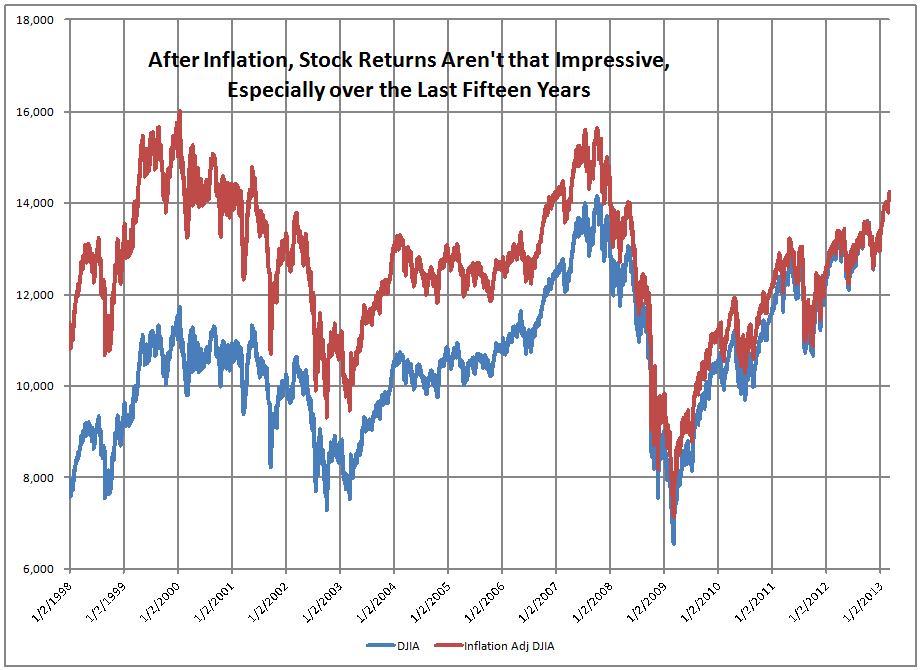I’ll let Buffett speak, and I will add a few comments.
When the partnership I ran took control of Berkshire in 1965, I could never have dreamed that a year in which we had a gain of $24.1 billion would be subpar, in terms of the comparison we present on the facing page.
But subpar it was. For the ninth time in 48 years, Berkshire?s percentage increase in book value was less than the S&P?s percentage gain (a calculation that includes dividends as well as price appreciation). In eight of those nine years, it should be noted, the S&P had a gain of 15% or more. We do better when the wind is in our face.
To date, we?ve never had a five-year period of underperformance, having managed 43 times to surpass the S&P over such a stretch. (The record is on page 103.) But the S&P has now had gains in each of the last four years, outpacing us over that period. If the market continues to advance in 2013, our streak of five year wins will end.
One thing of which you can be certain: Whatever Berkshire?s results, my partner Charlie Munger, the company?s Vice Chairman, and I will not change yardsticks. It?s our job to increase intrinsic business value ? for which we use book value as a significantly understated proxy ? at a faster rate than the market gains of the S&P. If we do so, Berkshire?s share price, though unpredictable from year to year, will itself outpace the S&P over time. If we fail, however, our management will bring no value to our investors, who themselves can earn S&P returns by buying a low-cost index fund.
I appreciate Buffett & Munger not changing their metric.? They could have said that the market return beat the S&P in 2012, but they didn’t.? Buffett is a compounder.? He figures that if he compounds net worth at an above average rate, he will beat the market returns of the S&P 500 over the intermediate term.? I agree; building intrinsic value will almost always lead to outperformance, unless the stock was significantly overvalued at the beginning.
On Searching for Acquisitions
Our luck, however, changed early this year. In February, we agreed to buy 50% of a holding company that will own all of H. J. Heinz. The other half will be owned by a small group of investors led by Jorge Paulo Lemann, a renowned Brazilian businessman and philanthropist.
We couldn?t be in better company. Jorge Paulo is a long-time friend of mine and an extraordinary manager. His group and Berkshire will each contribute about $4 billion for common equity in the holding company. Berkshire will also invest $8 billion in preferred shares that pay a 9% dividend. The preferred has two other features that materially increase its value: at some point it will be redeemed at a significant premium price and the preferred also comes with warrants permitting us to buy 5% of the holding company?s common stock for a nominal sum.
Once again, we don’t know all of the details, but it really looks like Buffett got the better part of the deal, and by a decent margin.? He continues:
Our total investment of about $12 billion soaks up much of what Berkshire earned last year. But we still have plenty of cash and are generating more at a good clip. So it?s back to work; Charlie and I have again donned our safari outfits and resumed our search for elephants.
As many expected, Buffett has more than enough cash to deploy if he sees the right deal.? With valuations being high, I don’t see how they fire the elephant gun, unless a company with protected boundaries wants to sell.
Though I failed to land a major acquisition in 2012, the managers of our subsidiaries did far better. We had a record year for ?bolt-on? purchases, spending about $2.3 billion for 26 companies that were melded into our existing businesses. These transactions were completed without Berkshire issuing any shares.
Charlie and I love these acquisitions: Usually they are low-risk, burden headquarters not at all, and expand the scope of our proven managers.
The tuck-in acquisitions of BRK are particularly valuable.? Done out of the spotlight, they get done at reasonable terms, and grow BRK organically.
The new investment managers, Combs and Weschler, did well in 2012, and Buffett is giving them more assets to manage.
As noted in the first section of this report, we have now operated at an underwriting profit for ten consecutive years, our pre-tax gain for the period having totaled $18.6 billion. Looking ahead, I believe we will continue to underwrite profitably in most years. If we do, our float will be better than free money.
Now interest rates are low, and underwriting standards are far tougher across the industry than if we were in a high interest rate environment.
Let me emphasize once again that cost-free float is not an outcome to be expected for the P/C industry as a whole: There is very little ?Berkshire-quality? float existing in the insurance world. In 37 of the 45 years ending in 2011, the industry?s premiums have been inadequate to cover claims plus expenses. Consequently, the industry?s overall return on tangible equity has for many decades fallen far short of the average return realized by American industry, a sorry performance almost certain to continue.
What Buffett is saying is that his float is unique because:
- His company underwrites carefully.
- There is a decent amount of long-tailed business.
- The short-tailed business (GEICO) is growing, which makes short-dated float feel long — in essence Buffett can borrow short and invest long, for now.
A further unpleasant reality adds to the industry?s dim prospects: Insurance earnings are now benefitting [sic] from ?legacy? bond portfolios that deliver much higher yields than will be available when funds are reinvested during the next few years ? and perhaps for many years beyond that. Today?s bond portfolios are, in effect, wasting assets. Earnings of insurers will be hurt in a significant way as bonds mature and are rolled over.
He is overstating the case here.? Most P&C insurers run short asset portfolios and have already adjusted to the low interest rate environment.
Now regarding the non-insurance operating businesses of BRK, they almost all had good years in 2012.? I’m not going to say more, though I will say that Buffett spent too much ink on newspapers; it is a teensy part of BRK.
Finally. Buffett talks about dividends.? There are two major ideas here:
- Dividends are tax-disadvantaged versus buybacks.
- If you can compound earnings at an above-average rate, there is no reason to ever pay a dividend.
What this might mean is that when a future CEO of BRK concludes that “there are no more worlds left to conquer” a la Alexander the Great, it would be reasonable to pay a dividend.? That said, he could also:
- Centralize HR, legal and other functions.
- Streamline subsidiaries, and make fewer managers manage more of BRK.
- E.g., turn BRK into a real company.
There would be many ways to reshape BRK post-Buffett.? There are benefits and costs to doing that, but I think the benefits would be significant, unless the new CEO could keep the “hands off” way that Buffett does private equity.
Full Disclosure: Long BRK/B



